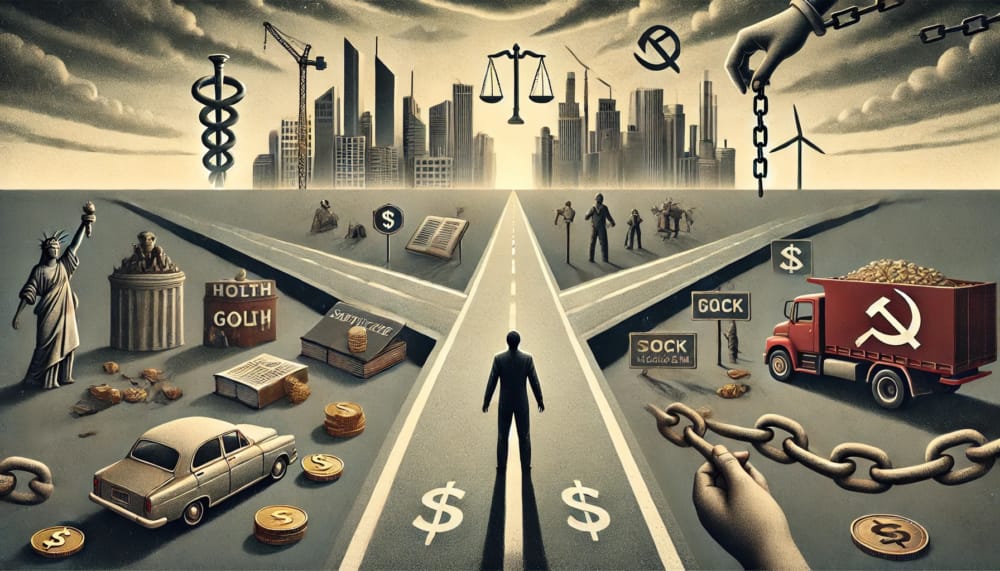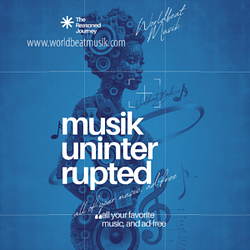In a world driven by economic systems, progress is often measured by profit margins and market value. But beneath these figures, there’s a deeper, more pressing question: What are the moral trade-offs involved in these systems? How do they address the fundamental human needs for freedom and equality? What are the real-world consequences for individuals and societies?
These are not abstract ideas. They are the very principles shaping your life. Whether your society emphasizes competition or seeks equality, the ideologies governing these systems influence your mental health, personal freedom, and even access to basic needs.
Capitalism: The Freedom to Succeed, The Freedom to Fail
Capitalism places individual freedom at the center of its ideology. You have the right to own, trade, and accumulate wealth. This creates a society where freedom is closely tied to economic opportunity, but what happens when success and failure are dictated by factors outside your control?
In a capitalist economy, your access to basic resources—healthcare, food, and housing—is often determined by your financial success. This raises the question: Does capitalism respect life when only the wealthy can comfortably meet their basic needs?
Moral Trade-offs: The primary trade-off in capitalism is between personal freedom and equality. You are free to pursue wealth, but this freedom comes at the cost of leaving many without the resources necessary to live with dignity. In this system, inequality is accepted as a byproduct of personal freedom. The rich have access to life’s luxuries and necessities, while the poor often struggle to survive.
Real-World Consequences: Consider healthcare in the United States, a capitalist society where 9.2% of the population lacked health insurance as of 2021. For those with wealth, access to the best care is a given. For those without it, life and health become conditional. The market dictates who lives with comfort and who dies from neglect. Is this a society that values life?
While capitalism offers freedom, it often sacrifices equality. If you have wealth, you experience freedom in a broad sense—freedom to choose your job, healthcare, or education. But if you’re poor, your choices narrow to mere survival.
How It Addresses Human Needs: Capitalism prioritizes individual freedom but neglects equality. It assumes that personal liberty is the highest good, even if it comes at the expense of others’ well-being. If you succeed, you thrive. If you fail, the system has little room for compassion.
Marxism: Equality at the Cost of Freedom
Marxism emerges as a direct critique of capitalism’s inequality. It seeks to abolish the class system and ensure that all people have access to the resources they need to live, without exploitation. In theory, Marxism addresses both freedom and equality by creating a system where no one profits at the expense of others.
Moral Trade-offs: While Marxism promises equality, the trade-off is often personal freedom. In its pursuit of collective ownership, the state assumes control over most aspects of life—work, resources, and even thought. The individual’s desires and freedoms are subordinated to the needs of the collective. While economic equality is pursued, personal freedom is often lost.
Real-World Consequences: Look to the Soviet Union for an example. The government’s attempt to create equality resulted in mass surveillance, imprisonment of dissidents, and restricted personal autonomy. The Holodomor, a famine in Soviet Ukraine (1932-1933), claimed millions of lives due to state-controlled policies. Equality, in this case, did not mean respect for life.
The desire to eliminate inequality often led to authoritarian regimes, where freedom of speech, assembly, and political participation were suppressed. While Marxism sought to protect people from economic exploitation, it frequently imposed another form of oppression through state control.
How It Addresses Human Needs: Marxism focuses heavily on equality, seeking to remove the exploitation inherent in capitalist systems. It addresses the human need for security and fairness but does so at the cost of personal freedom. Under Marxist regimes, you might receive equal access to resources, but you lose the freedom to dissent or make personal choices about your life and work.
Communism: The Ideal of Classlessness and the Reality of Control
Communism builds on the ideas of Marxism, promising a world without class divisions, where resources are shared equally, and everyone works for the collective good. Theoretically, it offers both freedom and equality by eliminating private property and class hierarchies. In practice, however, Communism has often led to the concentration of power in the hands of the state, eroding both life and liberty.
Moral Trade-offs: The moral trade-off in Communism is striking: to achieve equality, the state must control nearly every aspect of life. This control, while meant to ensure fairness, often results in the suppression of personal freedoms. The promise of equality is undermined by the reality of authoritarian governance.
Real-World Consequences: In North Korea, a modern Communist state, basic freedoms like speech and movement are severely restricted. The government controls nearly all resources, and severe punishments are imposed on those who challenge the state. Food shortages have led to widespread malnutrition, with the regime denying external aid and silencing dissent. The government may claim to serve the collective good, but in reality, the individual’s life and freedom are sacrificed for state control.
How It Addresses Human Needs: Communism aims to create a world where everyone’s basic needs are met, but it often does so through coercive means. While it addresses the need for equality, it fails to protect personal freedom. In a Communist state, your life is valued only to the extent that it serves the goals of the state.
Socialism: A Balance of Life and Liberty
Socialism offers a compromise between capitalism’s focus on freedom and Marxism’s pursuit of equality. It seeks to ensure that everyone has access to essential resources like healthcare, education, and housing, while still preserving individual freedoms in other areas of life. Socialism, particularly in democratic forms, strives to balance the moral demands of respecting both life and freedom.
Moral Trade-offs: Socialism’s primary trade-off is between individual wealth accumulation and collective well-being. High taxation supports social programs, but individuals are still free to own property, start businesses, and pursue personal goals. It tempers capitalism’s inequality while avoiding the authoritarian control often associated with Marxist and Communist regimes.
Real-World Consequences: Look at Sweden. The government ensures that everyone has access to healthcare and education, with 11% of GDP allocated to healthcare. No one is left behind. Life expectancy is high, and the gap between the rich and the poor is smaller than in more capitalist nations. Yet, personal freedom is preserved. Citizens are free to start businesses, express political opinions, and live without fear of repression.
Sweden’s success shows that it is possible to ensure both freedom and equality, though this comes at the cost of higher taxation and extensive government involvement in economic affairs.
How It Addresses Human Needs: Socialism recognizes that humans need both security and autonomy. It provides a social safety net to ensure that everyone can live with dignity, while still preserving personal freedom. You are free to make choices about your life, but you are also protected from the worst consequences of failure.
The Real-World Impacts on Human Life and Freedom
When you live in these systems, the moral trade-offs aren’t theoretical. They shape your daily life. Capitalism offers freedom, but only to those with wealth. Marxism and Communism promise equality but often at the expense of freedom. Socialism strikes a balance, providing both life-sustaining resources and the freedom to pursue personal goals.
The real question is: Which system truly respects the inherent dignity of human life and the need for freedom? Does a system that allows the rich to thrive while others suffer respect life? Does a system that enforces equality through oppression respect freedom?
Final Thought
In the end, each system has its moral flaws. Capitalism sacrifices equality for personal freedom. Marxism and Communism sacrifice freedom for equality. Socialism, particularly in democratic forms, attempts to balance both, ensuring that neither life nor liberty is abandoned.
Your life is shaped by these systems, and the moral choices they make on your behalf. The question remains: Which system best respects both your right to live and your right to be free?
Discover more from The Reasoned Journey
Subscribe to get the latest posts sent to your email.


